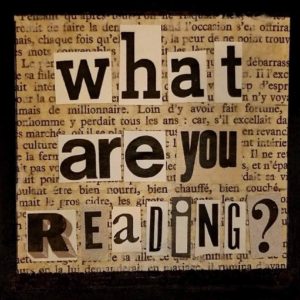
Thinking along the lines of complex characters, non-conforming women with agency, and sapphic romance in the fantasy genre, I thought I’d stop by with a recent read:
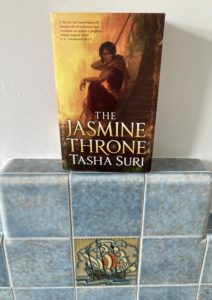
The Jasmine Throne; by Tasha Suri

Thinking along the lines of complex characters, non-conforming women with agency, and sapphic romance in the fantasy genre, I thought I’d stop by with a recent read:

The Jasmine Throne; by Tasha Suri
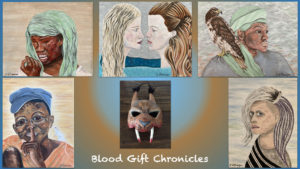
June 2022 was the month for finally getting together to celebrate last year’s release, The Warder. The event was set to go ahead here in Exeter, and preparations were going swimmingly…

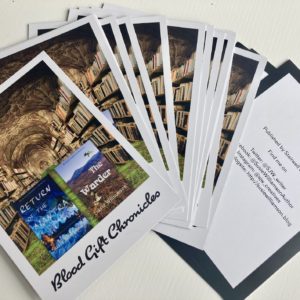
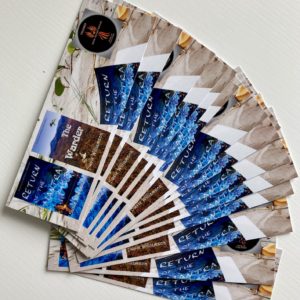
but alas, we were thwarted by Covid. Life can be as unpredictable as the twists and turns of our stories, and so came a last-minute shift onto zoom.
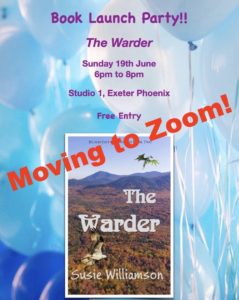

Hosted by my publishers, the lovely folks of Stairwell Books, and joined by local guest readers bringing more fantasy, folklore, poetry and rhyme, it was lovely to spend time in the company of other writers, as well as readers of my series so far. And onto my readings.
With a brief intro. to Book One, Return of the Mantra, I was reminded of intrepid Suni and her search for justice and her own identity. Thrust into some stark environments, she discovers what she’s really made of, in contrast to the mountaintop view where her worldview is forever changed. And of course, when you’re up against tyranny and fighting for the natural world, it takes more than one voice. Onto Book 2, The Warder, where we get to know more of our heroines and heroes.

With three main characters in The Warder, three scenes jumped out at me to share.
Wanda, an eighteen-year-old young man, gifted but also cursed by a shadow bound to him. One of his opening scenes is a favourite, looking out over the grasslands, searching for respite from his curse.
Ten-year-old Luna, troubled by strange visions, experiences her own personal breaking high in the mountains.
And, perhaps holding it all together, Suni returns, working to restore harmony to her hometown, while using her gift to watch out over her young friend.
The dominoes are falling, squeezing characters and revealing timeless bonds. All set in a world with new lands revealed, where old and new, the mundane and the fantastical, coexist. Prepare to be cast away to an archipelago of islands in the far western reaches, with the musty air of the cavernous temple and the sound of footsteps crossing the mosaic-tiled floor; in contrast to the warm desert winds of Shendi, carrying spells and curses that touch all those with the gift to hear…
With themes of wildlife and the environment, social justice and marginalisation, magic, animism, being true to oneself, and dragons… Not to mention a diverse range of character arcs revealing love in all its forms.
Prior to the event, I set myself a project to imagine what my characters might look like. Of course, it’s ultimately for readers to draw their own conclusion, but I’ll leave you with the result of the project: a series of portraits, my own artistic interpretation of my beloved characters that span the series, Blood Gift Chronicles.
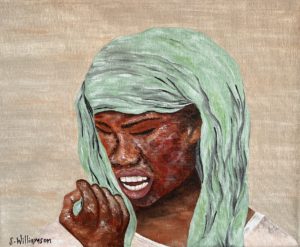
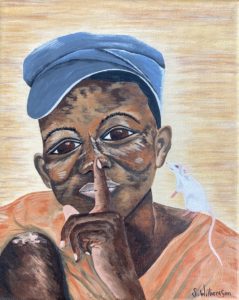
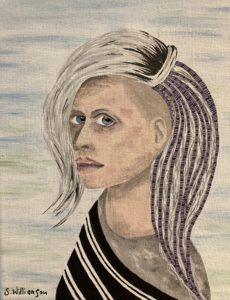
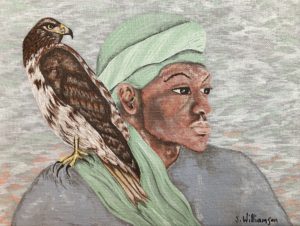
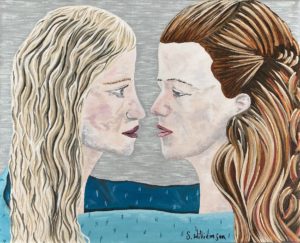
Happy Reading!
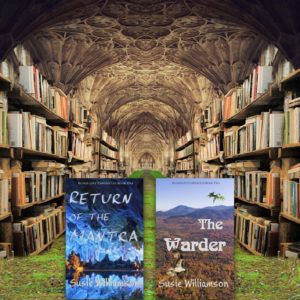
It’s been a week of furniture building and the house being upside down, including, shock horror, my writing room being out of action, and bookshelves out of reach. Among plenty of sorting and cleaning, I made progress on a latest painting project, more on that another time. And for solace, I thought of some of my favourite characters from fantasy fiction.
Any here that you recognise?
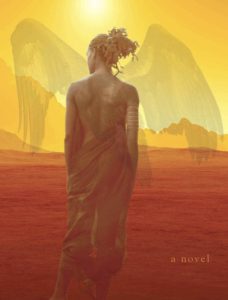
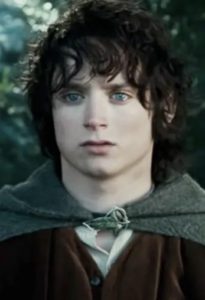
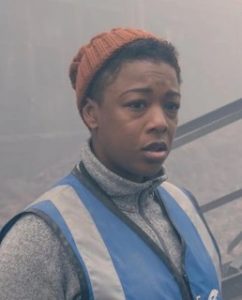
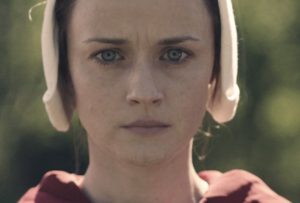
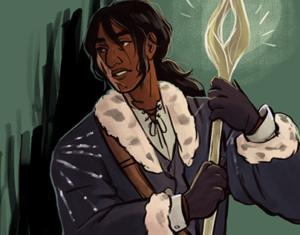
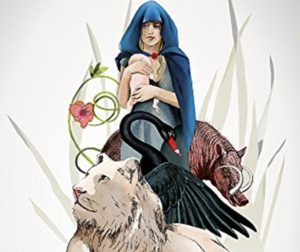
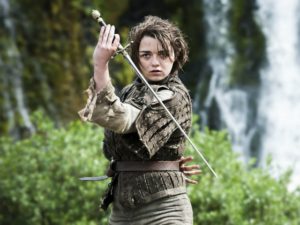

Rooted in the imagination, the inventive genre of fantasy knows no bounds. And soon, soon I’ll be back on Book 3 of Blood Gift Chronicles. And I’m looking forward to it, seeing how the world further expands bringing new landscapes, new people, new vivid sensory images to delight, appal, and offer up a spot of virtual travelling. We all have some favourite story places. I would gladly visit the lands of Patricia McKillip’s The Forgotten Beasts of Eld, and share a meal with Sybel in her cottage on Eld Mountain, watched by her weird and wonderful menagerie called by wizardry. Or a visit to the remote deserts of apocalyptic Sudan, in Nnedi Okorafor’s Who Fears Death, and meet with Onye, a powerful, gifted, flawed, steadfast young woman. I can still hear the sound of her singing voice communing with the desert.
George R.R. Martin said, ‘We read fantasy to find the colours again, I think. To taste strong spices and hear the songs sirens sang.’
Yes to all of the above, and to learn, reflect, challenge, escape, have fun, and flex that all important muscle – the imagination. Fantasy shines a new light, and creates a different edge. It redefines boundaries and allows for reclamation of landscapes. It offers up worlds filled with adventure, to inspire, offer hope, and teach us that anything really is possible. It shines a light on our identities, letting us know we are valid and valued, despite our strengths and flaws. It emboldens us to demonstrate we can tackle our demons, fight for our cause, and realise a state of peace and empowerment. And so much more.
So there is no shortage of inspiration, in a genre that can extend to the reach of your imagination. I look back fondly on scenes from the first two books in Blood Gift Chronicles: some of the stark environments thrust on Suni in Return of the Mantra, where she discovers what she is made of, contrasted with a mountaintop view where her view of the world will be forever changed. And in The Warder, as the dominoes fall, squeezing characters and revealing timeless bonds, the world extends into new lands where old and new, the mundane and the fantastical, coexist. If I close my eyes I’m transported to the islands and the musty air in the cavernous temple, with the sound of footsteps crossing the mosaic-tiled floor; in contrast to the warm desert winds of Shendi, carrying spells and curses that touch all those with the gift to hear…
Finally, I’m happy to report I’m back in my writing room, ready to explore new worlds.

Have a great weekend!

I have a treat in store for this episode of ‘For the Love of Books’, with a trilogy that reminds me of all I love about the YA fantasy genre. I anticipated enjoying the Book of Fire series, with feral people, a wild girl and hidden forests – what’s not to love? It’s all that, and so much more.
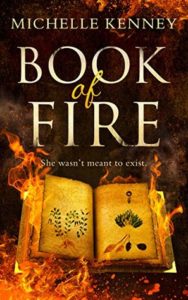
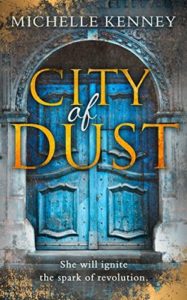
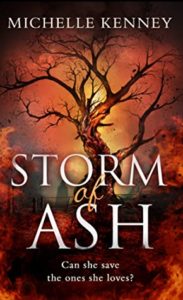
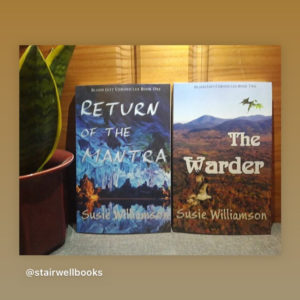
March saw the one-year anniversary of my sequel, The Warder (Blood Gift Chronicles Book 2). It’s a strange thing to release a book during lockdown, yet the year has been busy regardless, with online events including travelling to Montreal from the comfort of home for World Fantasy Convention 2021. A few in-person events to Birmingham, Bristol and the lovely Weston-Super-Mare were great opportunities to meet readers and join panels that always leave you with more questions than you can ever answer, which is why there are always more books to write!
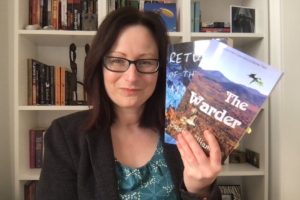
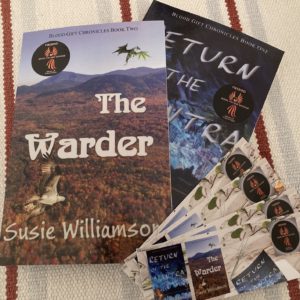
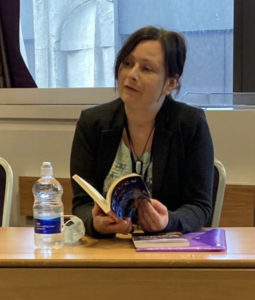
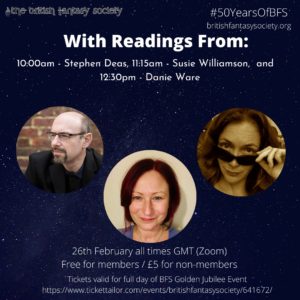
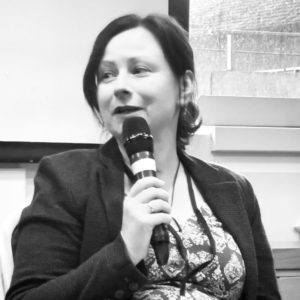
Winning Firebird Awards for both Blood Gift Chronicles novels so far was a real highlight! Click here for my radio interview. https://www.speakuptalkradio.com/author-susie-williamson/

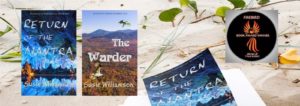
And, WOW to be compared to the phenomenal Ursula Le Guin in the latest review of The Warder. Click here.
And the reviews keep coming.
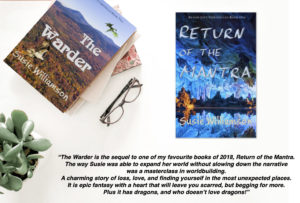
Some recent 5*reviews for Return of the Mantra were gratefully received, and raised some thought-provoking points. Plus it’s always wonderful to hear that these characters we painstakingly bring to life are loved and appreciated and strike a chord with readers.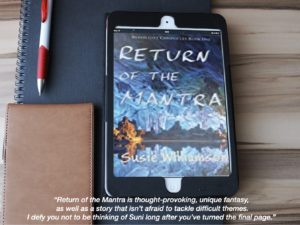
Click here for review by Yvonne Hendrie: “The otherworldliness of this novel is magical, but the issues Suni faces jab at our consciousness because her world is a microcosm of our own. It’s this which allows the reader to explore their own feelings and responses and ask what they would do in the place of Suni and indeed all the characters who must make difficult choices and decisions. We can do this only because the characters are so real – alive, flawed, trying to survive and thrive while the world around them disintegrates. A truly thought-provoking novel.”
Click here for review by Eliza Mood: “Enjoyed this fantasy of rites of passage touching on belief, spirituality, inner strength. A fable resonant for our time.”
Click here for review by Michelle Kenney: “Return of the Mantra is thought-provoking, unique fantasy, as well as a story that isn’t afraid to tackle difficult themes. I defy you not to be thinking of Suni long after you’ve turned the final page.”
Thank you, Michelle. I feel the same way about Suni, actually about a number of characters in Blood Gift Chronicles. I am currently working on Blood Gift Chronicles Book 3, introducing some new characters, expanding the world to incorporate new landscapes, while prominent faces from the first two books remain. The world is connected and events can throw the most unlikely lives together, pretty much like the world as we know it. I’m enjoying expanding on the story, while hopefully laying the way for readers to venture into unlikely places.
One of my favourite quotes from Lord of the Rings:
“I wish it need not have happened in my time,” said Frodo.
“So do I,” said Gandalf, “and so do all who live to see such times. But that is not for them to decide. All we have to decide is what to do with the time that is given us.”
And I wonder, would Suni, Zandi, Juna, Wanda and co. share Frodo’s sentiment or Gandalf’s. And I say, choose well, because there is no saying where this next adventure may lead…
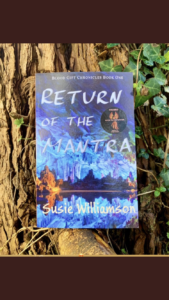

Happy Reading!
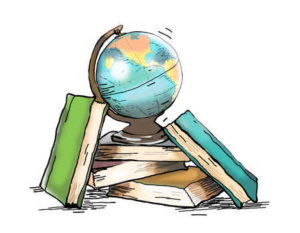
I recently saw a thread on twitter, asking the question, ‘Should we celebrate things when doing so feels like a travesty?’ There’s so much happening in the world that is hard, heart-breaking, scary and overwhelming. Is it then wrong to celebrate World Book Day, art, or the women who inspire us? Finding strength and empathy in times of crises requires resilience. Hopelessness leads to apathy; powerlessness leads to paralysis. So how do we build resilience that allows us to fight for change and do what is within our power?
Perhaps we build resilience through hope, and stave off despair by sharing ideas, strength and joy. That magic ingredient which energises each of us is individual to who we are. For me, it’s stories, books and art, community, and common goals that create positive change. And so, themed on International Women’s Day, comes my blog of two parts. Art news is still to come, but first, a blog from my world of books.
I have many favourite women authors: Octavia Butler, Nnedi Okorafor, Ursula Le Guin, to name a few. All are/were pioneers in their own right, and creative witnesses to the past, present and future. I was delighted to receive a short but sweet recent review of my novel, The Warder, and to be compared to the mighty Ursula Le Guin (blush).
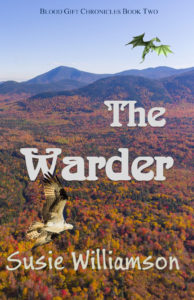
And in celebration of International Women’s Day, I joined the lovely folks of Stairwell Books for an online event, alongside other authors and readers, sharing readings and discussion on the subject of eco feminism, climate change, and the place of fiction. It was great to hear readings from Border 7 and O Man O Clay, two dystopian novels I’ve read and loved. As I gave a reading from my own, Return of the Mantra, I was reminded of the origins of my debut. A fantasy novel with themes of climate change, and contrasting worlds inspired by the landscapes of the Sudan, and South Africa, where I once lived.
Quick recap: The main character is a young woman called Suni. She’s brought up in a desert town ruled by a tyrant leader. All she has known is desert and drought that has lasted for decades. She’s been raised to believe in the old ways of the Mantra, which has a mythology around the cause of the drought. And so begins her story of self-discovery and identity, and a fight for the natural world. She believes the resistance of old are dead, and that there is nothing beyond desert, until she discovers a hidden world where nature is hanging on – I won’t give more away, but on the subject of positivity, I went for an extract that inspires hope.
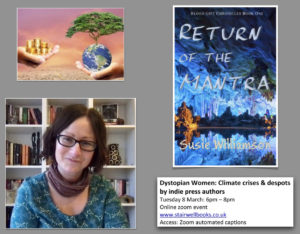
Click here for the YouTube link to the event, and my extract reading.
It’s what I think fiction can do well, give hope: bring empathy where it’s lacking, shine a light on injustices, show us how strong we can be when the odds are stacked against us, or just allow us the joy of reading. We drive our characters on through thick and thin, and (unless they don’t!) they survive. Themes of climate change run throughout the backdrop of Return of the Mantra. In the following sequels, the story takes a different turn as the world unfolds, but nature still features. I hadn’t necessarily planned it that way, but as I work through Blood Gift Chronicles Book 3, I realise how closely my characters live alongside wildlife. Perhaps there’s hope we can all close the gap between humanity and the natural world.
What are you reading?
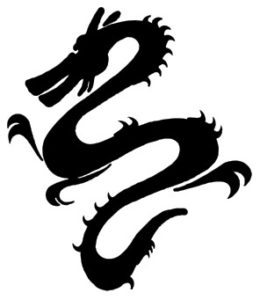
It’s proving to be a fantasy-filled Saturday here at the British Fantasy Society’s Jubilee event – thank you Zoom! Given a reading slot for The Warder, Book Gift Chronicles Book 2, it was great to be able to squeeze in extracts highlighting the points of view of the three main characters. First up, Luna, a girl plagued by visions. Then her older cousin, Wanda, a young man gifted and also cursed by a shadow bound to him. And finally, someone who Wanda shares history with, a woman gifted to watch over her young friend.
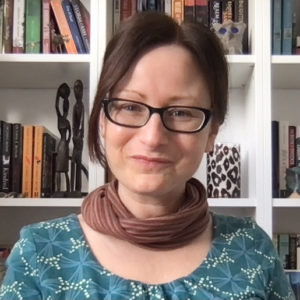

As it turned out, the timing worked well, with my reading following a fascinating and fun Fantastical Creatures panel. Storytelling being as old as time, it’s interesting to consider what sparked the big cat legends, or how big birds carrying babies away might have given rise to the first flying dragons. And in the world as we know it, with species going extinct, how stories of dragons often feature a certain melancholy, analogous to real world extinctions. Whatever the origin, from lumbering giants and fearsome trolls, to magical elves and vampires, mythical creatures have captured imaginations since the dawn of time. Spawned from their environment, whether its selkies in a loch, or bogies chasing hunter/gatherers, they are used to entertain, to uphold morality, to connect to the divine, and warn against dangers. And they teach humility. There are things bigger than us, things beyond our control, things of the unknown.
Dragons featured heavily in the panel, of course, with discussion that got me thinking about the dragons I introduce in my own series. Rather than simply other-worldly, havoc-wreaking creatures that are an extension of the existing natural world, the dragons in my series are two-fold: an introspection of the dragons within us, woven into storylines analogous to trauma, loss, mental health, love, loyalty, and empowerment; and yes… the ultimate power rendering us common folk helpless. And then things change again in the final instalment, Book 3, and oh I’m having fun with the magic in that…
It’s such a great genre to work in, with so much scope, and fun – in many ways a great homage to the magic of childhood. As for incorporating fantastical creatures, the options are endless. Do we lean into existing creatures and their tropes, or create something new? As familiar as dragons are, I’m definitely going for a wholly fresh, new angle. And never say never to inventing something entirely from scratch. With so many folders on file and ideas to mull over, new creatures are in there taking shape. Perhaps the imagination is a muscle. The more you use it, the bigger it gets. Love what you do and I certainly do love creating thought-provoking and colourful fantasy worlds that might also just offer some insight into the world as we know it.
To finish, I’ll leave you with a couple of fantastical creature story recommendations: The Forgotten Beasts of Eld by Patricia McKillip, featuring a fantastical menagerie including a swan, a dragon, a lion and a boar; and The Water Bailiff’s Daughter by Yvonne Hendrie, for lovers of selkies.
What are you reading?

In this book post I thought I would give a nod to our younger characters, in two wonderful YA books that, like all books of this genre, are for readers of all ages. The first of my recommendations is inspired by the fact that it is LGBTQ+ history month.
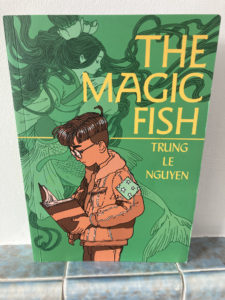
The Magic Fish, by Trung Le Nguyen
The Magic Fish is a wonderfully unique story that carries powerful messages about identity, acceptance and love. It’s a long time since I read a graphic story, and this re-introduction was a great reminder of the power of graphics. The animations are beautifully descriptive and require few words to illustrate what is a complex journey for our main character, Tien. From the outset, it may appear like a small story, but this is the story of a boy living in social margins, an immigrant story among others things, and one that offers astonishing depth.
Tien has a story to tell his parents, but communication is difficult: they are refugees struggling to learn English, while Tien doesn’t know the words in Vietnamese to come out to them as gay. The answer lies in fairy tales – a language that Tien and his parents share. With the help of fairy tales, family and friends, Tien discovers how to tell his story to those close to him, how to accept himself and ultimately navigate the world. It is a novel told with interlinking storylines weaving between reality and fairy tales, so sweet and poignant and with an ending that is utterly heart-warming.
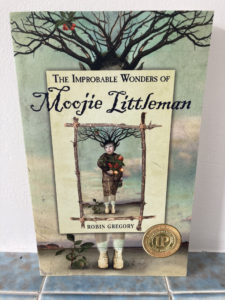
The Improbable Wonders of Moojie Littleman, By Robin Gregory
Born in 1892, a baby boy is found tucked inside a wooden fishing basket by the nuns of San Miguel de las Gaviotas. So begins Moojie Littleman’s journey of fantasy, magical realism, and miracles that are as real as the visiting extraterrestrials.
“He arrived on the heels of an earthquake. A minor hiccup as disasters go, the murmur rippling undersea, causing dories in the bay to bob and spider crabs to flood the beach like a ghostly pink tide.”
Moojie ends up in the care of his hard-hearted grandpappy. It’s an unsympathetic home for a biracial and partially-disabled boy with unique and tender magical gifts, and an innate empathy for humans, animals and nature. Until he answers the call of the wild, and discovers kindred spirits. So begins a series of trials as Moojie is called to a great destiny. But can he survive one last terrifying trial?
It is a magical tale of love, belonging, and pilgrimage, unique and inspiring and creatively told, with prose that comes alive on the page, lyrical and enchanting. It is a story that oozes with optimism, speaks of possibilities, and has you believing that miracles really do exist.
What are you reading?

I have a real treat in store for this episode of For the Love of Books: two titles with themes of the natural world, albeit it an extraordinary natural world. The first was one of my favourite reads of 2021.
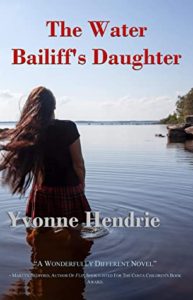
The Water Bailiff’s Daughter by Yvonne Hendrie
The Water Bailiff’s Daughter is such an unusual read and one I adored. Set against the atmospheric shores of Loch Duie on the western coast, Scottish folklore is woven into the extraordinary tale of Helena Hailstanes, part witch, part otter, part human. It’s a story of self-discovery, as Helena comes to terms with her connection to the ancient race of shape-shifting otters, a connection she shares with her father, Sam.
The extraordinary is also very much rooted in the mundane, bringing to life all the complexities of family. The writing flows with ease, concise in its descriptions that brings the place alive on the page. The dialogue draws you in to characters that left me rooting for each member of this messy, complex family that learns to pull together against the odds. Love, loyalty and mutual respect flourish and grow in this place so tangible I can almost feel the cold waters of the loch and smell the fishy aroma of an otter’s favourite meal.
Each character is on their own path of self-discovery. Sam, a man intimately connected to his otter side, chooses loyalty, forgoing natural instincts to conform for those he grows to love. Through Rose, Sam’s wife, we see the reality of a woman’s place and what she must overcome to be permitted a respectable place in the community. And the main character, Helena, is forced to navigate adolescence: destined to live a small life hidden from the wider world, she yearns for more. All this while discovering her true heritage, her otter instincts, and the truth that overshadows all else. With destinies entwined, there is a reason Helena is closely watched over by the sea witch, Megan. But nothing is predictable in the world of this extraordinary heroine.
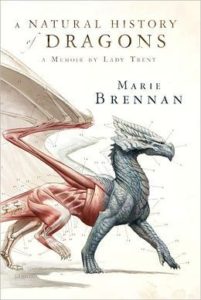
A Natural History of Dragons by Marie Brennan
A Victorian woman, Lady Isabella Trent, defies societal conventions with her love of books, natural history and dragons. The book reads as a historical memoir, in the style of classical literature, themed around a wildlife adventure; indigenous wildlife being dragons. Reading like a travel log, written in the first person, the character voice and perspective of Lady Trent was consistent, believable, and provided a new angle that felt unique and fresh.
We first meet Isabella as a girl who collects sparklings, is a voracious reader and loves dragons. She marries a man who accepts her unconventional interests, and at 19 years old, Lady Trent ventures out on her first expedition: dragon spotting on the mountains of Vystrana.
The story is character driven and includes some interesting analogies. This is a woman who comes face to face with dragons, yet on a night of wakefulness, wandering the streets, it is men and an ‘outrage upon my honour’ she fears most. The general context of stifling sexism is well placed for the era, and dragons are Lady Trent’s escape. Her adventures perfectly depict that moment of awe when rounding a corner or emerging atop a summit, and being faced with the extraordinary sight of a dragon full flight, or stretched out across a gentle slope. These sightings, together with scientific discoveries and an in-depth analysis of dragon anatomy, were my favourite parts, in a read where dragons have never felt so real.
What are you reading?

New Year’s Eve was a day for tying up loose ends, making plans, visiting friends, and a quick trip to one of my favourite places in Exeter: the quay.
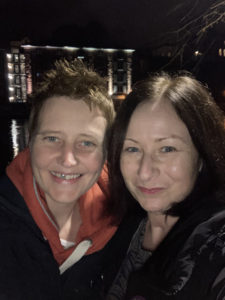
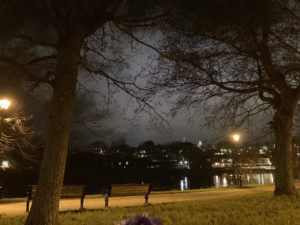
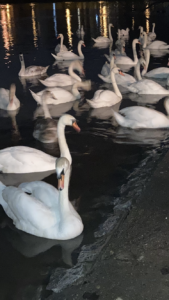
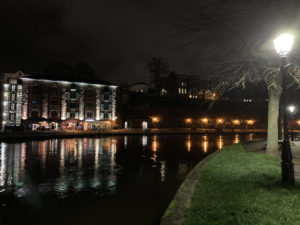
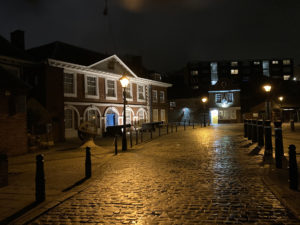
The streets were quiet, but the late-night skies were ablaze with fireworks. Now ever-so-slightly-bleary eyed and time to reflect.
2021 has been a memorable year in more ways than one. I was super proud to be able to release The Warder, Blood Gift Chronicles Book 2, and to receive Firebird Awards for both Return of the Mantra (winner of LGBTQ fiction category) and The Warder (winner of YA fiction category). Click here for my award interview.

Like its predecessor, The Warder was a labour of love over many years, and it’s great to hear from readers who have got in touch or listened at various on-line and in-person events this year.
“The Warder is the sequel to one of my favourite books of 2018, Return of the Mantra. I wasn’t sure Susie would be able to increase the enthusiasm I had for her characters and her world, but she left me reeling after a couple of pages.”
“The way Susie was able to expand her world without slowing down the narrative was a masterclass in worldbuilding.”
‘This book is a charming story of loss, love and finding yourself in the most unexpected places. It is epic fantasy with a heart that will leave you scarred but begging for me. Plus it has dragons and who doesn’t love dragons. I can’t wait to return to this world.”
Click here for full review.
I couldn’t wait to return to the world either, and have been immersed in book 3, working towards the conclusion of the overarching story that connects these three books. Tying up loose ends is hugely satisfying, while further developing the landscapes of the world, complete with new characters and familiar faces at the next stage of their lives. With colour, depth, texture and layers, I’m excited to get back to the writing.
For now a pause as we tip into January, complete with a fresh new diary just waiting to be filled.
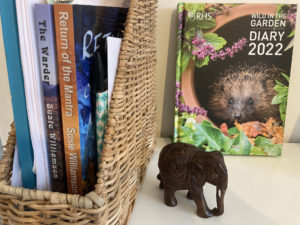
I love this time of year, these moments of calm after the busyness of Xmas, the quiet after fireworks to consider possibilities for the year ahead.
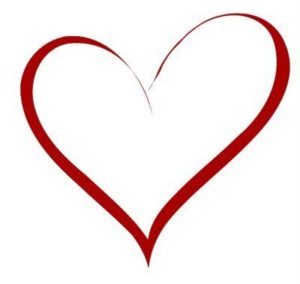
Wishing everyone a Happy, Healthy, Peaceful, Creative, Wonderful New Year 2022!!